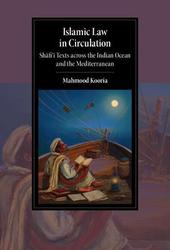
|
Islamic Law in Circulation: Shafi'i Texts across the Indian Ocean and the Mediterranean
Hardback
Main Details
| Title |
Islamic Law in Circulation: Shafi'i Texts across the Indian Ocean and the Mediterranean
|
| Authors and Contributors |
By (author) Mahmood Kooria
|
| Series | Cambridge Studies in Islamic Civilization |
|---|
| Physical Properties |
| Format:Hardback | | Pages:336 | | Dimensions(mm): Height 235,Width 156 |
|
| Category/Genre | Islam |
|---|
| ISBN/Barcode |
9781009098038
|
| Classifications | Dewey:340.59091824 |
|---|
| Audience | |
|---|
| Illustrations |
Worked examples or Exercises; Worked examples or Exercises
|
|
Publishing Details |
| Publisher |
Cambridge University Press
|
| Imprint |
Cambridge University Press
|
| Publication Date |
31 March 2022 |
| Publication Country |
United Kingdom
|
Description
Analysing the spread and survival of Islamic legal ideas and commentaries in the Eastern Mediterranean and the Indian Ocean littorals, Islamic Law in Circulation focuses on Shafi'ism, one of the four Sunni schools of Islamic law. It explores how certain texts shaped, transformed and influenced the juridical thoughts and lives of a significant community over a millennium in and between Asia, Africa and Europe. By examining the processes of the spread of legal texts and their roles in society, as well as thinking about how Afrasian Muslims responded to these new arrivals of thoughts and texts, Mahmood Kooria weaves together a narrative with the textual descendants from places such as Damascus, Mecca, Cairo, Malabar, Java, Aceh and Zanzibar to tell a compelling story of how Islam contributed to the global history of law from the thirteenth to the twentieth century.
Author Biography
Mahmood Kooria is a researcher at Leiden University (the Netherlands) and a visiting faculty of history at Ashoka University (India). Previously he was a postdoctoral researcher at the Dutch Institute in Morocco (NIMAR), Rabat; the International Institute for Asian Studies (IIAS) and the African Studies Centre (ASC), Leiden.
Reviews'Mahmood Kooria's examination of how Shafi'i legal texts travelled across time and space, creating intellectual communities and linkages, represents a new and exciting methodological direction for Islamic legal studies. A tradition of interconnected scholarship stretching out over centuries is expertly mapped out, introducing the field to new and unexplored contexts. Kooria's detailed research feeds into a wider portrayal of the remarkable diversity, longevity and vitality of the Shafi'i school in the late premodern period, happening in scholarly contexts beyond the traditional centres. Through his meticulous new work, our vistas of Islamic legal history are broadened - the book will be read, and re-read, heralding a new and exciting focus for future research.' Robert Gleave, University of Exeter 'This is the definitive account of how one school of Islamic law came to dominate the Indian Ocean rim, not through state conquest or sponsorship, but via cross-cultural negotiations among mobile scholars and merchants from Africa, Arabia and Asia. This landmark study of transregional texts and contexts is an indispensable guide to the shared educational syllabi and religious resonances one encounters from Mombasa to Mindanao. A remarkable achievement.' Engseng Ho, Duke University 'With expansive breadth and fine-grained analysis, Mahmood Kooria takes on one of the most enduring narratives in world history, on the place of Islamic law in maritime Asia. This book rewrites the history of the early modern Indian Ocean and forces us to rethink much of what we know of the legal history of the Islamic world. It will be read, debated, and cited for many years to come.' Fahad Ahmad Bishara, University of Virginia 'This book on the Sha fi'i legal school and its followers along the Indian Ocean rim is a much needed intervention in the study of Islamic law. It sidesteps the traditional focus on the Middle East, placing circulating Arabic jurisprudential texts in diverse social and linguistic contexts. A real tour de force.' Nandini Chatterjee, University of Exeter 'With expansive breadth and fine-grained analysis, Kooria takes on one of the most enduring narratives in world history, on the place of Islamic law in maritime Asia. This book rewrites the history of the early modern Indian Ocean, and forces us to rethink much of what we know of the legal history of the Islamic world. It will be read, debated and cited for many years to come.' Fahad Ahmad Bishara, University of Virginia 'This book on the Sha fi'i legal school and its followers along the Indian Ocean rim is a much-needed intervention in the study of Islamic law. It sidesteps the traditional focus on the Middle East, placing circulating Arabic jurisprudential texts in diverse social and linguistic contexts. A real tour de force.' Nandini Chatterjee, University of Exeter 'Mahmood Kooria's examination of how Sha fi'i legal texts travelled across time and space, creating intellectual communities and linkages, represents a new and exciting methodological direction for Islamic legal studies. A tradition of interconnected scholarship stretching out over centuries is expertly mapped out, introducing the field to new and unexplored contexts. Kooria's detailed research feeds into a wider portrayal of the remarkable diversity, longevity and vitality of the Sha fi'i school in the late premodern period, happening in scholarly contexts beyond the traditional centres. Through his meticulous new work, our vistas of Islamic legal history are broadened - the book will be read, and re-read, heralding a new and exciting focus for future research.' Robert Gleaves, University of Exeter 'Mahmood Kooria's Islamic Law in Circulation is the definitive account of how one school of Islamic law came to dominate the Indian Ocean rim, not through state conquest or sponsorship, but via cross-cultural negotiations among mobile scholars and merchants from Africa, Arabia and Asia. This landmark study of transregional texts and contexts is an indispensable guide to the shared educational syllabi and religious resonances one encounters from Mombasa to Mindanao. A remarkable achievement.' Engseng Ho, Duke University
|